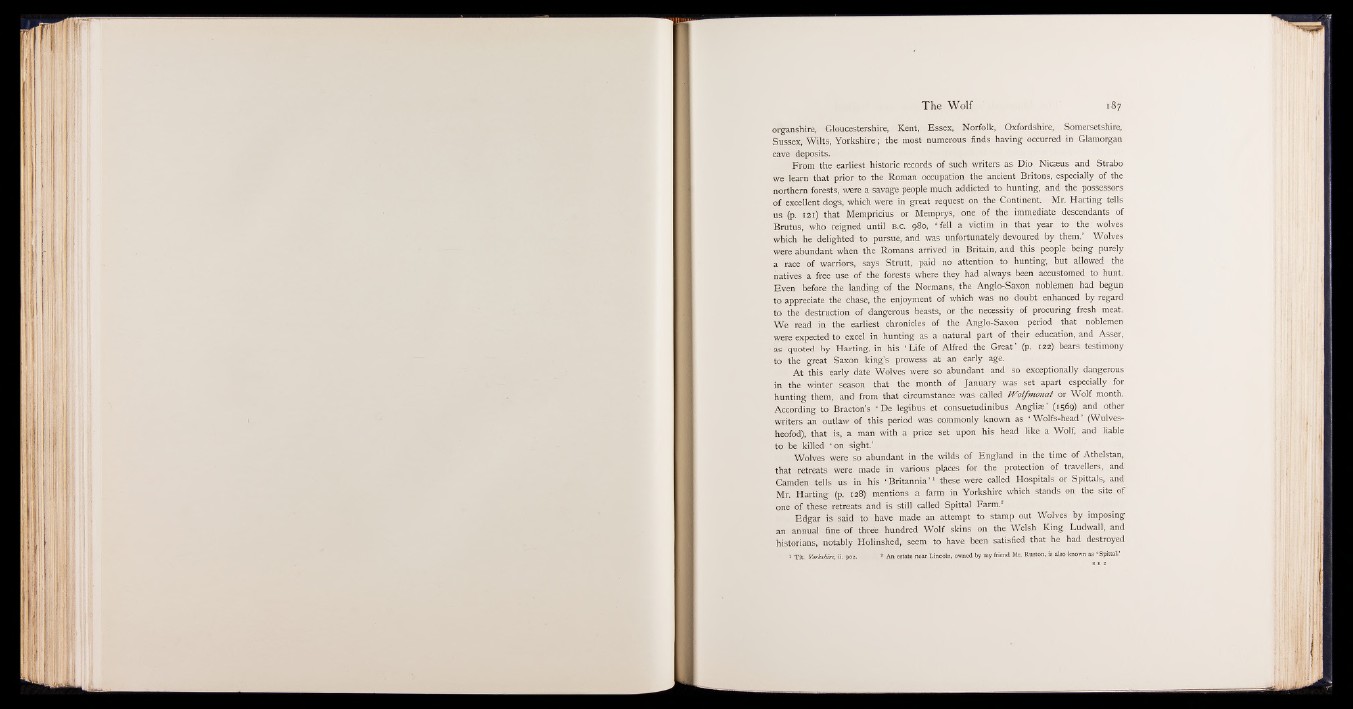
organshire, Gloucestershire, Kent, Essex, Norfolk; Oxfordshire, Somersetshire,
Sussex, Wilts, Yorkshire; the most numerous finds having occurred in Glamorgan
cave deposits.
From the earliest historic records of such writers as Dio Nicaeus and Strabo
we. learn that prior to the Roman occupation the ancient Britons, especially of the
northern forests, were a savage people much addicted to hunting, and the possessors
of excellent dogs, which were in great request on the-Continent. Mr. Harting. tells
us (p. 121) that Mempricius or Memprys, one of the immediate descendants of
Brutus, who reigned until B.c. 980, ' fell, a victim in that year to the wolves
which he delighted to pursue, and was unfortunatelyrdevoured by them.’ Wolves
were abundant when the Romans arrived in Britain, and this people being purely
a race of warriors, says Strutt, paid no attention to hunting, but allowed the
natives a free use of the forests where they had always been accustomed to hunt.
Even before the landing of the Normans, the Anglo-Saxon noblemen had begun
to appreciate the chase, the enjoyment of which was no doubt enhanced by regard
to the destruction of dangerous beasts, or the necessity, of procuring fresh meat.
We read in the earliest, chronicles of the Anglo-Saxon period that noblemen
were expected to excel in hunting as a natural part of their education, and Asser,
as quoted b y Harting, in his 'Life of Alfred the Great’ (p. 122). bents gjtimony
to the great Saxon king’s prowess at an early age.
At this early date Wolves were so abundant and so exceptionally dangerous
in the winter season that the month of Januaiy was set apart especially for
hunting them, and from that circumstance was called Wolfmonat or Wolf month.
According to Bract6n’l§ D e legibus et consuetudinibus Anglia;’ (1569) and other
writers an outlaw of this period was commonly known as ‘Wolfs-head’ (Wulves-
heofod), that is, a man with a price set upon his head like a Wolf, and, liable
to be killed 'on sight.’
Wolves were so abundant in the wilds of', England in the time of Athelstan,
that retreats were made in various planes for the protection of travellers, and
Camden tells us in his ‘ Britannia’ 1 these were called Hospitals;;or Spittals, and
Mr. Harting fp.- 128) mentions a farm in Yorkshire which stan|| on the site, of
one of these retreats and is still called Spittal Farm.2
Edgar is said to have made am attempt to stamp out Wojps; by imposing
an annual fine of three hundred Wolf skins on the Welsh?, King Ludwall, and
historians, notably Holinshed, seem to have been satisfied that he had destroyed
1 -pit. Yorkshire, ii. 902. 2 An estate near Lincoln, owned by my friend Mr. Ruston, is also known as * Spittal.’